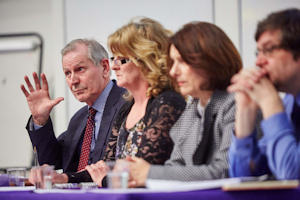Future of age-friendly cities
19 Mar 2015
Public debate calls for society to acknowledge the potential and opportunities associated with an older population

A public debate hosted by the Manchester Institute for Collaborative Research on Ageing (MICRA) has called for older people to be celebrated as a positive force for social change.
MICRA Executive Director, Professor Chris Phillipson argued that society had retained negative and outdated stereotypes of old age.
Speaking at ‘The future of age-friendly cities questions and answer evening’, he identified three key issues for developing age-friendly cities:
- Using the resources of cities to improve the quality of life in old age
- Ensuring that isolated groups of older people are connected to key services and networks
- Promoting new mechanisms of participation in areas such as urban planning and design.
The debate also called for older people to be celebrated as a positive force for social change.
Chris was joined by panellists Paul McGarry from Manchester City Council, Bernadette Ashcroft, CEO of Age UK Tameside and Professor Rachel Cooper, member of the future of cities lead expert group for the Government’s Foresight Research Project. Councillor Sue Cooley, Lord Mayor of Manchester, chaired the session.
The Q&A session was hosted by the MICRA with partners Age UK and Manchester City Council.
The debate attracted 170 registered attendees from community groups, local government, the NHS, as well as older people and academia. Building on the organisers’ close working relationship with government bodies, the evening gathered evidence to influence government thinking and policy development.
Discussion centred on how to improve the lives of older people ‘ageing in place’ over the next 25 years in urban environments. Transport emerging as a major challenge for older people, with a vision to create spaces accessible to all modes of transport – bikes, wheelchairs, prams, motability scooters – and to consider all users when designing spaces. Greater Manchester devolution was raised as an opportunity to promote real innovation in transport and neighbourhood services.
